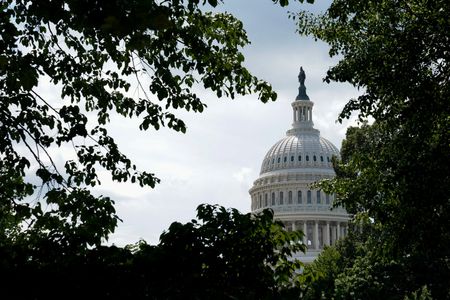 1
1 1
1
By Patricia Zengerle
WASHINGTON (Reuters) -The Republican-led U.S. House of Representatives added restrictions on abortion and transgender health services to its version of the National Defense Authorization Act (NDAA) on Thursday, threatening the defense policy bill’s chances of becoming law.
Voting largely along party lines, the House backed several measures pushed by the Republican party’s hard right, angering Democrats who accused the majority party of injecting “culture war” issues into the must-pass bill and said they would not support it.
The House voted 221 to 213 for an amendment that would reverse the Defense Department’s policy of reimbursing expenses for service members who travel to obtain an abortion and by 222 to 211 for a ban on the Pentagon paying for gender-affirming surgeries and hormone treatment.
The House also voted 341 to 89 and 358 to 70 to defeat two proposals to cut funding for Ukraine as it battles Russia, reflecting bipartisan support for Kyiv. All of the votes against the aid came from Republicans.
The NDAA is one of the few major pieces of legislation that Congress passes every year. This year’s legislation authorize $886 billion in spending for the Department of Defense.
The inclusion of divisive social issues imperils the measure’s chances of becoming law, after six decades of annual passage. Republicans have a 222-212 seat majority in the House and can pass their version of the NDAA without Democratic support.
But Democrats have a 51-49 majority in the Senate.
As the amendment votes continued, the Democratic leaders of the House Armed Services Committee, which authored the original bill, took the unusual step of announcing they would oppose the amended NDAA.
“The bill we passed out of committee sent a clear, united message to our allies and partners, global competitors, and the American people that democracy still works, and Congress is still functional,” they said in a statement.
“That bill no longer exists. What was once an example of compromise and functioning government has become an ode to bigotry and ignorance,” they said.
Republicans accused Democrats of injecting “propaganda” into the military and weakening U.S. forces by backing diversity and inclusion programs.
“We would like to make the military focused on killing people and blowing stuff up again, because that’s what the military is supposed to be for,” said Republican Representative Chip Roy.
The NDAA is several steps from becoming law. The House could pass its version as soon as Friday, but the Senate is not expected to vote on its bill until later this month.
After passage of the separate bills, members will hammer out a compromise version, which must pass both the House and Senate before it can be sent to the White House for President Joe Biden to sign into law or veto.
Congress has passed the NDAA every year since 1961.
(Reporting by Patricia Zengerle; Editing by David Gregorio, Robert Birsel)